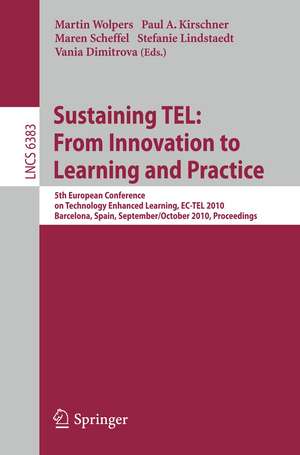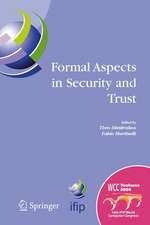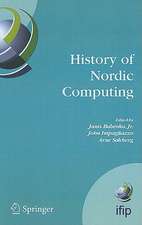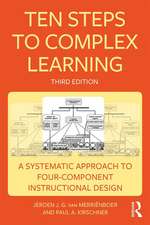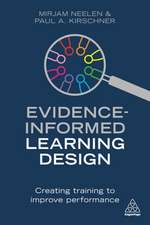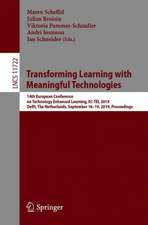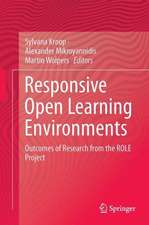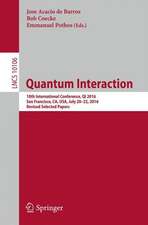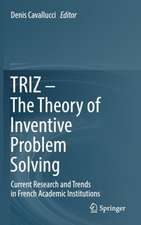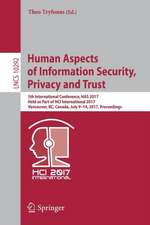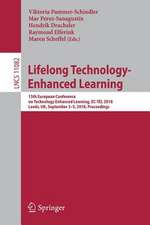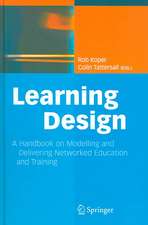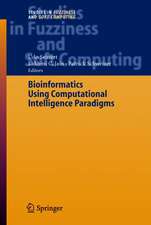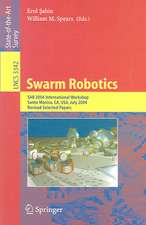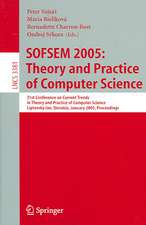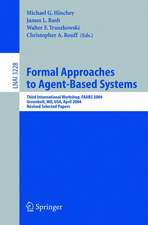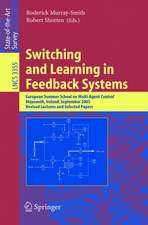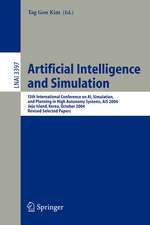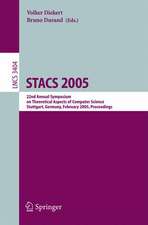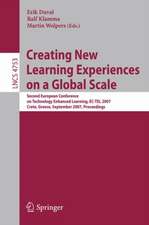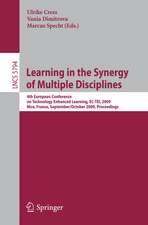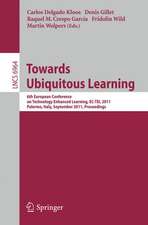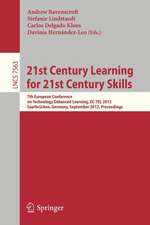Sustaining TEL: From Innovation to Learning and Practice: 5th European Conference on Technology Enhanced Learning, EC-TEL 2010, Barcelona, Spain, September 28 - October 1, 2010, Proceedings: Lecture Notes in Computer Science, cartea 6383
Editat de Martin Wolpers, Paul A. Kirschner, Maren Scheffel, Stefanie Lindstaedt, Vania Dimitrovaen Limba Engleză Paperback – 27 sep 2010
Din seria Lecture Notes in Computer Science
- 20%
 Preț: 1040.03 lei
Preț: 1040.03 lei - 20%
 Preț: 333.46 lei
Preț: 333.46 lei - 20%
 Preț: 335.08 lei
Preț: 335.08 lei - 20%
 Preț: 444.17 lei
Preț: 444.17 lei - 20%
 Preț: 238.01 lei
Preț: 238.01 lei - 20%
 Preț: 333.46 lei
Preț: 333.46 lei - 20%
 Preț: 438.69 lei
Preț: 438.69 lei -
 Preț: 440.52 lei
Preț: 440.52 lei - 20%
 Preț: 336.71 lei
Preț: 336.71 lei - 20%
 Preț: 148.66 lei
Preț: 148.66 lei - 20%
 Preț: 310.26 lei
Preț: 310.26 lei - 20%
 Preț: 256.27 lei
Preț: 256.27 lei - 20%
 Preț: 632.22 lei
Preț: 632.22 lei - 17%
 Preț: 427.22 lei
Preț: 427.22 lei - 20%
 Preț: 641.78 lei
Preț: 641.78 lei - 20%
 Preț: 307.71 lei
Preț: 307.71 lei - 20%
 Preț: 1053.45 lei
Preț: 1053.45 lei - 20%
 Preț: 579.56 lei
Preț: 579.56 lei -
 Preț: 373.56 lei
Preț: 373.56 lei - 20%
 Preț: 330.23 lei
Preț: 330.23 lei - 15%
 Preț: 429.74 lei
Preț: 429.74 lei - 20%
 Preț: 607.39 lei
Preț: 607.39 lei - 20%
 Preț: 538.29 lei
Preț: 538.29 lei -
 Preț: 389.48 lei
Preț: 389.48 lei - 20%
 Preț: 326.98 lei
Preț: 326.98 lei - 20%
 Preț: 1386.07 lei
Preț: 1386.07 lei - 20%
 Preț: 1003.66 lei
Preț: 1003.66 lei - 20%
 Preț: 567.60 lei
Preț: 567.60 lei - 20%
 Preț: 575.48 lei
Preț: 575.48 lei - 20%
 Preț: 571.63 lei
Preț: 571.63 lei - 20%
 Preț: 747.79 lei
Preț: 747.79 lei - 15%
 Preț: 568.74 lei
Preț: 568.74 lei - 17%
 Preț: 360.19 lei
Preț: 360.19 lei - 20%
 Preț: 504.57 lei
Preț: 504.57 lei - 20%
 Preț: 172.69 lei
Preț: 172.69 lei - 20%
 Preț: 369.12 lei
Preț: 369.12 lei - 20%
 Preț: 346.40 lei
Preț: 346.40 lei - 20%
 Preț: 574.05 lei
Preț: 574.05 lei -
 Preț: 402.62 lei
Preț: 402.62 lei - 20%
 Preț: 584.40 lei
Preț: 584.40 lei - 20%
 Preț: 747.79 lei
Preț: 747.79 lei - 20%
 Preț: 809.19 lei
Preț: 809.19 lei - 20%
 Preț: 649.49 lei
Preț: 649.49 lei - 20%
 Preț: 343.16 lei
Preț: 343.16 lei - 20%
 Preț: 309.90 lei
Preț: 309.90 lei - 20%
 Preț: 122.89 lei
Preț: 122.89 lei
Preț: 650.18 lei
Preț vechi: 812.72 lei
-20% Nou
Puncte Express: 975
Preț estimativ în valută:
124.43€ • 129.25$ • 103.36£
124.43€ • 129.25$ • 103.36£
Carte disponibilă
Livrare economică 13-27 ianuarie 25
Preluare comenzi: 021 569.72.76
Specificații
ISBN-13: 9783642160196
ISBN-10: 3642160190
Pagini: 660
Ilustrații: XI, 649 p. 152 illus.
Greutate: 0.92 kg
Ediția:2010
Editura: Springer Berlin, Heidelberg
Colecția Springer
Seriile Lecture Notes in Computer Science, Programming and Software Engineering
Locul publicării:Berlin, Heidelberg, Germany
ISBN-10: 3642160190
Pagini: 660
Ilustrații: XI, 649 p. 152 illus.
Greutate: 0.92 kg
Ediția:2010
Editura: Springer Berlin, Heidelberg
Colecția Springer
Seriile Lecture Notes in Computer Science, Programming and Software Engineering
Locul publicării:Berlin, Heidelberg, Germany
Public țintă
ResearchCuprins
Section 1. Invited Papers.- Tackling HCI Challenges of Creating Personalised, Pervasive Learning Ecosystems.- Section 2. Full Papers.- Maintaining Continuity of Inquiry Learning Experiences across Contexts: Teacher’s Management Strategies and the Role of Technology.- Ultra-Personalization and Decentralization: The Potential of Multi-Agent Systems in Personal and Informal Learning.- Learning Spaces as Representational Scaffolds for Learning Conceptual Knowledge of System Behaviour.- Investigating Teachers’ Understanding of IMS Learning Design: Yes They Can!.- Task Performance vs. Learning Outcomes: A Study of a Tangible User Interface in the Classroom.- Content, Social, and Metacognitive Statements: An Empirical Study Comparing Human-Human and Human-Computer Tutorial Dialogue.- Authenticity in Learning Game: How It Is Designed and Perceived.- Orchestrating Learning Using Adaptive Educational Designs in IMS Learning Design.- Management of Assessment Resources in a Federated Repository of Educational Resources.- Knowledge Maturing Activities and Practices Fostering Organisational Learning: Results of an Empirical Study.- Demands of Modern PLEs and the ROLE Approach.- How to Share and Reuse Learning Resources: The ARIADNE Experience.- Towards Improved Support for Adaptive Collaboration Scripting in IMS LD.- Providing Varying Degrees of Guidance for Work-Integrated Learning.- Automatic Detection of Local Reuse.- Developing and Validating a Rigorous and Relevant Model of VLE Success: A Learner Perspective.- The Design of Teacher Assistance Tools in an Exploratory Learning Environment for Mathematics Generalisation.- Representing the Spaces When Planning Learning Flows.- Studying the Factors Influencing Automatic User Task Detection on the Computer Desktop.- Learning 2.0Promoting Innovation in Formal Education and Training in Europe.- Extended Explicit Semantic Analysis for Calculating Semantic Relatedness of Web Resources.- Leveraging Semantic Technologies for Harmonization of Individual and Organizational Learning.- Learning from Erroneous Examples: When and How Do Students Benefit from Them?.- Enhancing the Learning Process: Qualitative Validation of an Informal Learning Support System Consisting of a Knowledge Discovery and a Social Learning Component.- Section 3. Short Papers.- Pattern-Mediated Knowledge Exchange in Non-Governmental Organizations.- Modelling a Stakeholder Community via a Social Platform: The Case of TELeurope.eu.- Scenario-Based Multi-User Virtual Environments: Productive Failure and the Impact of Structure on Learning.- Experimentation and Results for Calibrating Automatic Diagnosis Belief Linked to Problem Solving Modalities: A Case Study in Electricity.- Exploring Mediums of Pedagogical Support in an across Contexts Mobile Learning Activity.- Overview and Preliminary Results of Using PolyCAFe for Collaboration Analysis and Feedback Generation.- A Framework for the Domain-Independent Collection of Attention Metadata.- Who Students Interact With? A Social Network Analysis Perspective on the Use of Twitter in Language Learning.- Conditions and Effects of Teacher Collaboration within a Blended Professional Development Program for Technology Integration.- Enhancing Learning with Off-Task Social Dialogues.- Section 4. Poster Papers.- Audience Interactivity as Leverage for Effective Learning in Gaming Environments for Dome Theaters.- Free-Riding in Collaborative Diagrams Drawing.- Affordances of Presentations in Multi-Display Learning Spaces for Supporting Small Group Discussion.- Recommending Learning Objects According to a Teachers’ Contex Model.- Preferences in Multiple-View Open Learner Models.- Supporting Free Collaboration and Process-Based Scripts in PoEML.- A Simple E-learning System Based on Classroom Competition.- Computerized Evaluation and Diagnosis of Student’s Knowledge Based on Bayesian Networks.- An Interoperable ePortfolio Tool for All.- Disaster Readiness through Education - Training Soft Skills to Crisis Units by Means of Serious Games in Virtual Environments.- Ambient Displays and Game Design Patterns.- PWGL, Towards an Open and Intelligent Learning Environment for Higher Music Education.- Vicarious Learning from Tutorial Dialogue.- Computer-Supported Argumentation Learning: A Survey of Teachers, Researchers, and System Developers.- End-User Visual Design of Web-Based Interactive Applications Making Use of Geographical Information: The WINDMash Approach.- Supporting Reflection in an Immersive 3D Learning Environment Based on Role-Play.- Facilitating Effective Exploratory Interaction: Design and Evaluation of Intelligent Support in MiGen.- GVIS: A Facility for Adaptively Mashing Up and Representing Open Learner Models.- Introducing a Social Backbone to Support Access to Digital Resources.- Towards an Ergonomics of Knowledge Systems: Improving the Design of Technology Enhanced Learning.- Using Personal Professional Networks for Learning in Social Work: Need for Insight into the Real-World Context.- Deep Learning Design for Sustainable Innovation within Shifting Learning Landscapes.- Evaluation of the Software “e3-Portfolio” in the Context of the Study Program “Problem-Solving Competencies”.- Components of a Research 2.0 Infrastructure.- Exploring the Benefits of Open Standard Initiatives for Supporting Inquiry-Based Science Learning.- Monitoring andAnalysing Students’ Systematic Behaviour – The SCY Pedagogical Agent Framework.- Section 5. Demonstration Papers.- iAPOSDLE – An Approach to Mobile Work-Integrated Learning.- A Haptic-Based Framework for Chemistry Education.- Intelligent Tutoring with Natural Language Support in the Beetle II System.- ScenEdit: An Intention-Oriented Authoring Environnment to Design Learning Scenarios.- Skill-Based Scouting of Open Management Content.- The Complexity of Integrating Technology Enhanced Learning in Special Math Education – A Case Study.- TAO – A Versatile and Open Platform for Technology-Based Assessment.
